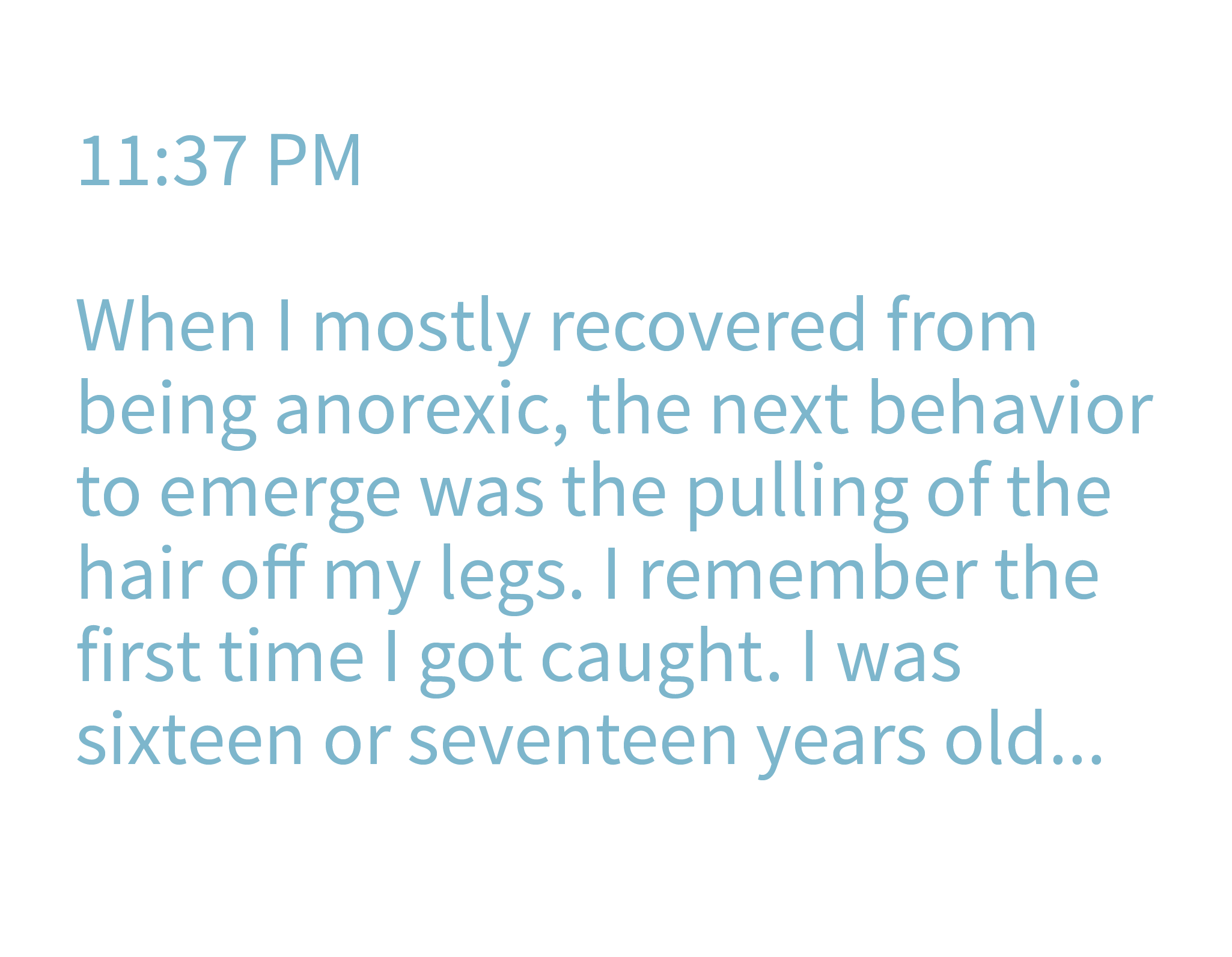11:37 PM
When I mostly recovered from being anorexic, the next behavior to emerge was the pulling of the hair off my legs. I remember the first time I got caught. I was sixteen or seventeen years old, accompanying my mother to the store. It was a sunny summer’s day and I had no hesitation in wearing shorts. It hadn’t struck me as common human behavior to examine a stranger’s bare legs long enough to notice freckled galaxies of little red welts. But my mother was no stranger. When she bent down next to me to pick up a receipt she had dropped, she saw my legs at point-blank range. She seized my wrist and gasped theatrically. What horrendous disease had I contracted, what assault had I endured?
The ensuing conversation can go two ways.
I only know secondhand how some parents react when they discover their child’s slit wrists or other self-inflicted scars. The heart-breaking question is similar. How is that a child they loved and cared for—and sure, who over time has grown distant and disagreeable on many topics—come to hate herself so much to the point of self-mutilation? Nothing prepares a parent to confront the darkest depths of the human spirit, hiding in plain sight. But, after the trauma of the shock, and beside the lingering horror, there is a conversation. It is one with plentiful opportunities to misinterpret and deepen wounds, but also with some to build stronger bridges.
Or, the conversation can go another way. In this scenario, the parent does not yet discern or believe in the ghosts lurking behind the behaviors. All a mother is faced with is her daughter’s legs of unsightly red welts, the result of a rather repugnant and childish habit.
I sought an explanation to offer to her, but it seemed precarious for a teenager to start speaking in terms of self-loathing and self-destruction. And it wasn’t wholly accurate to equate this to slitting one’s wrists. Maybe best just to endure the scolding and the glares.
Years later I learned that the term is trichotillomania. I’m sure sufferers of other addictions or disorders share this experience. In those first years of my silence on and solitude with the behavior, I didn’t realize that this thing of mine was already a well-studied piece of human knowledge, that there was a term for that.
Hair is everywhere, especially for anorexic bodies. So my arms and fingers were next, then my eyebrows, and then the hairs on my head. Fortunately, perhaps, my own trichotillomania has never resulted in the obvious bald patches. But it seems that the action is more conspicuous than I would have liked to believe. Co-workers and friends would later privately tell me that oh yeah, they have noticed my hand move towards my scalp during meetings. I usually keep the conversation at the simple admission that yes, I do have a bad habit and I want to try and stop. But any further elaboration would leave me vulnerable to misinterpretations and deeper wounds in this world that everyone says is already moving too fast.
12:52 AM
It’s spring of 2020. And it seems the world has fallen asleep. The night for now seems interminable, even the epidemiologists say. Time, our collective circadian rhythm, was what bound me to the world outside of myself, with all of its codes and standards. Now, we have some repose from a daily life of relentless performance and evaluation. The others are rejoicing at this liberation. It is a thorny rock we live on, a modern world of judgment from all fronts. But this cessation of all social and industrial activity, well it has only taken away that rock that I clung to, hurtful thorns and all.
Now that I am here alone, keeping away from the news and journaling instead, I suppose I’ll try to explain my bad habit. In case you’d like to know what I am doing, I am feeling for the imperfect hairs. And there are many. I like feeling the length of each one run through enclosed fingertips, in anticipation of excising this impurity from my body. It’s not unlike grooming, but whereas grooming comes from the desire to beautify and clean the body, my trichotillomania comes from a pure disgust at the body itself. The starvation regimen of anorexia had run on the same principles. In the sovereign state of self-loathing, the less physical space the body occupies, the less of oneself there is, and the less matter weighing on my bones there is to repulse me. It’s why I am also known to be seen constantly clutching my wrists. I’m feeling the fat between my fingers, making sure there is not one ounce more than there was yesterday. Baubles or stress toys don’t have any appeal, for the simple reason that those objects are not a part of my body. And nothing replaces the sensation of pruning, squeezing, rending, and mutilating it.
To be clear, I’m not proud of these behaviors, and my wish to put an end to them is not a lie. But the impulses remain. I hate that I feel and act this way, but that doesn’t exactly help break a cycle of self-loathing.
01:28 AM
Confined to the walls of my flat, I only have the cruel company of my thoughts, many of which are unkind. They egg me on, to look, to bore down into the well of how far I can go. How far could I continue to mangle my scalp and limbs? There’s nobody to check in on me, whether with sympathy or with scolding glares. And there are no more obligations to participate in the world outside, no meetings, social events, or errands, nothing to interrupt my impulses with pangs of shame.
My thoughts wander to solitary alcoholics, addicts, anorexics, and other hair-pullers. Many of them are highly functional and contributing members of their communities in a world that’s awake. But in isolation, could they not slip dangerously deep and drown in their curses, with no one to see them fall? In the circumstances of a world that’s asleep, one might think little of the neighbor’s extended silence and solitude. But it is within a house of silence and solitude that we ease into becoming easier prey for our ghosts…
02:49 AM
I admit that on other anxious nights, I have exhausted the late hours extracting hairs. I only pick the ones I find to be contorted, damaged, and deviant from the straight fine hairs that are the majority of those on my head. There’s a biting remorse when three o’clock in the morning comes much more quickly than I was expecting. The clock used to be able to interject, ticking relentlessly down to the next appointments on the agenda. If I sacrificed too much sleep, tomorrow would claim retribution.
But the significance of three o’clock relies on our impending return to the outside world, the thorny rock of discrimination and ridicule, of insensitive codes and standards. But masquerading as a highly functional member of society, I’ve been clinging onto it. I hold on, because I’d otherwise be adrift in the open waters of a mania that can consume me entirely.
4:02 AM – some ungodly but irrelevant hour later…
Once, in my early twenties, I photographed my legs, freckled with sores. I had even conceptualized a sort of composite self-portrait using those photographs, perhaps in search of a way to express myself and this thing of mine. Reviewing the images days later, I beheld the power of photographs and the haunting permanence they bear. I couldn’t be certain that if you were to look upon them, that you would discern the ghosts beneath the repugnant habit. I wasn’t sure that I could, either.
So I deleted the photos.
And instead I’m writing this, now with a large, unkempt pile of hairs on the bedside table, which will also end up in the rubbish bin.
And all the while, the clocks persist, meekly waiting for their work to regain its importance.
Betsy Tsai is an emerging writer, and a documentary director and producer. Her most recent credits have earned international awards, including at the China Academy Awards of Documentary Film and the Tribeca Film Festival. From 2015-2019, she supported feature documentary filmmakers from around the world as a staffer of the Documentary Film Program at Sundance Institute. Betsy is a narrative film-directing alumna from UCLA, where she also studied English Literature and International Conflict Resolution. She grew up mostly in Silicon Valley, California, and for some years in Brussels, Belgium.

